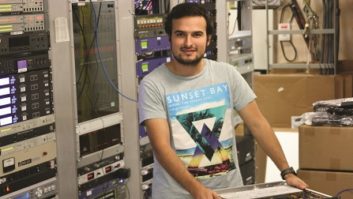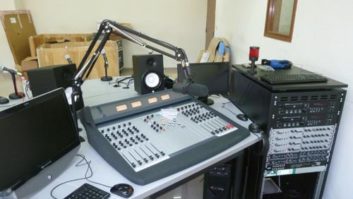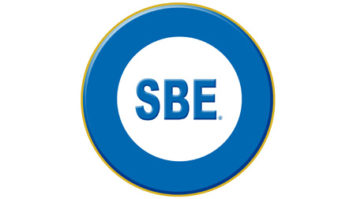The author is professor/coordinator of broadcast engineering for Loyalist College in Belleville, Ontario.
Broadcast engineering is not very well understood.
Radio, television and now Internet “broadcasting” have broad public appeal. However, while most people can identify with on-air personalities and even production crews, ask them to describe what a broadcast engineer does and you will often get what can only be described as blank, puzzled stares.

Garner Millward completes a lab on a Sony BVW75 VTR. When I confess to being a professor of broadcast engineering, my listener will try to imagine what that means. Even my mother-in-law proclaims, albeit with pride, “I’m not quite sure what it is that you do, but you obviously do it well, good for you.”
The truth, of course, is that long before production, playout, editing or transmission can take place, a broadcast engineer has been at work sweating the technical details. Using a language punctuated with decibels, kilowatts and gigabytes (foreign to most others), broadcast engineers quietly architect the systems that make the “magic” possible.
Perhaps identified in the past as a “pocket-protected” super nerd, the broadcast engineer necessarily has been transformed — by rapid change and increasing demands of profitability — into a multi-talented hybrid of engineer, IT professional and accounting-savvy dynamo.
What has always been a rewarding career continues to challenge engineers to keep current and to seek creative solutions as new technology comes to the fore. Lifelong learning is its own reward as professionals struggle to make sense of a future that seems forever changing. We’re talking about dedicated individuals who take great pride in keeping their respective stations on the air “no matter what it takes.”
Who’s next?
Yet it’s unfortunate to think, as many people do, that the aging population of broadcast engineers is headed for retirement without protégés to receive the benefit of their years of experience. Lessons learned at this school of hard knocks are invaluable.
It would seem that being part of a dynamic broadcast team in an exciting, rewarding field would entice people to choose this as a career path. But traditionally a number of factors contribute to low enrollment rates for new students. The anonymity of the job, as well as the obvious allure of the ever-expanding computer industry, draw young people in other directions, for example.
Educational institutions can’t do much about the glamour aspect. But they can address one problem: the lack of formal educational options.
For instance, in Canada, there was until recently only one choice, the Southern Alberta Institute of Technology. Located in Calgary, Alberta, SAIT runs a fine program and has for years seeded the industry with quality graduates, many of whom are now in senior positions in the industry. As an engineering manager myself, I often made the trek to Calgary to interview graduates in hopes of filling open positions.

Lindsay Youlton-Laroche is enthusiastic about the BRET program. But I often wondered why there weren’t schools in eastern Canada considering similar programs, closer to the target market. Thankfully, in 2008 Loyalist College took the plunge and began the Broadcast Engineering Technology program, changing the landscape for students in this part of the country.
Located near Toronto, a center for several Canadian broadcast networks, as well as the U.S. border, Loyalist offers a three-year advanced diploma program. Industry support has been nothing short of spectacular. An engaged advisory committee has provided direction and generous amounts of donated equipment to sustain this new program.
First-year students start with basic skills in electronics, computers, CAD and math as well as the soft skills that ultimately will be required.
In the second year, they begin their focus on broadcast-specific skills, with instruction in video, audio and radio frequency as well an introduction to specific equipment systems.
In their third year, they begin to apply these basics as they learn systems integration, project management and computer management that allow them to put it all together. There is always an emphasis on the changing nature of broadcasting; the economics of the business stay front-of-mind.
The students become familiar with the industry and potential employers through successive internships in spring of their second and third years.

Having completed the design, Paul Stilo finishes the wiring. Loyalist College has targeted an intake of 20 to 25 students in the first year, with an overall student population of 50, though it has yet to meet these targets.
Our facilities are housed in three labs, one dedicated to each of our three areas of focus: electronics, information technology and broadcasting. These have been equipped through capital support from the college and generous donation from the industry. We are able to replicate the design, build and commissioning of acquisition, production/editing and transmission systems. The college has demonstrated its commitment to the program through the hiring of a full-time professor, a full-time support staffer and six part-time faculty, as well as the capital commitment to the labs.
Graduates, I believe, enjoy a promising future. If last year’s internship experience is any indicator, industry demand for new graduates is high. Most interns stayed on with their employers and worked the summer months.
Loyalist College is committed to giving our graduates every advantage. Loyalist is certified with the Society of Broadcast Engineers; graduates who achieve a 70 percent average or better are eligible to seek accreditation as a CBT (Certified Broadcast Technologist) after successful completion of the society’s exam.
Broadcast engineering is a solid career choice for those who are technically inclined; but for now it is a well-kept secret. For me, the existence of Loyalist’s BET program is one answer to the common question, “Where will the next generation of broadcast engineers come from?”












